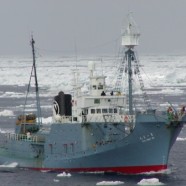Fish Eat Whales
The 63rd annual meeting of the International Whaling Commission (IWC) will take place from July 11th to 14th on the Channel Island Jersey.
Pro-whaling countries often state that whales must be culled to avoid competition with human fisheries. Japanese “scientific” documents show images of whales’ stomachs overflowing with small pelagic fish. According to Robin des Bois a defender of whales, one must continue to demonstrate that whales have positive effects not only on the world’s marine ecosystem but on all ecosystems. We cannot accuse whales of taking all and giving nothing to the oceans, while it is Man who takes all and gives nothing but pollution and increasing disturbances.
Fish Eat Whales
The 63rd annual meeting of the International Whaling Commission (IWC) will take place from July 11th to 14th on the Channel Island Jersey.
Pro-whaling countries often state that whales must be culled to avoid competition with human fisheries. Japanese “scientific” documents show images of whales’ stomachs overflowing with small pelagic fish. According to Robin des Bois a defender of whales, one must continue to demonstrate that whales have positive effects not only on the world’s marine ecosystem but on all ecosystems. We cannot accuse whales of taking all and giving nothing to the oceans, while it is Man who takes all and gives nothing but pollution and increasing disturbances.
Whaling Summit at the Channel Island Jersey
The 63rd annual meeting of the International Whaling Commission (IWC) will take place from July 11th to 14th on the Channel Island Jersey. Robin des Bois would like to take this opportunity to express strong concerns about the deterioration of sanitary state of whales following the tsunami and nuclear accident at Fukushima Daiichi which hit Japan and the North Pacific.
1- Radioactive Pollution
Iodine-131, cesium 137, strontium 90, plutonium are among the identified radionuclides which are spreading across Japanese soil by atmospheric emissions. The Northwest Pacific has become primary recipient for not only liquid discharges coming from Fukushima but also for atmospheric fallout. The sources of whale contamination are multiple: permanent contact with artificial radioactivity, ingestion of contaminated plankton, prey and waste, and the transmission of radioactivity to calves during nursing periods. The external and internal effects of this contamination are potentially mutagenic (mutation of the gene pool), teratogenic (abnormal development of the embryo) and carcinogenic, all very serious impacts on whale populations whose future before the disaster of March 2011 was already menaced.
Whaling Summit at the Channel Island Jersey
The 63rd annual meeting of the International Whaling Commission (IWC) will take place from July 11th to 14th on the Channel Island Jersey. Robin des Bois would like to take this opportunity to express strong concerns about the deterioration of sanitary state of whales following the tsunami and nuclear accident at Fukushima Daiichi which hit Japan and the North Pacific.
Whales, Nagoya Blabla
The Conference on Biodiversity taking place in Nagoya Japan ends today while, in November, the Japanese whaling fleet will leave for Antarctica to catch 1,000 whales. Since 1986, when the moratorium on commercial whaling entered into force Japan has killed, in the name of science, 13,210 whales of which close to 10,000 were caught in Antarctica, a whale sanctuary since 1994. Considering the state of the Japanese whaling fleet, the entire Antarctic ecosystem is threatened by an oil spill.









